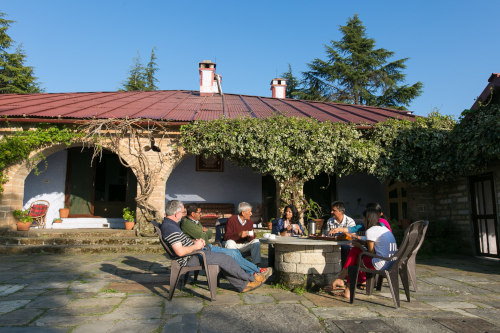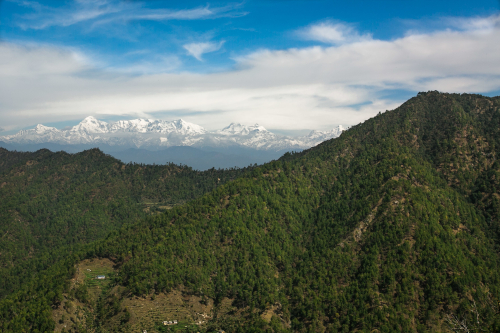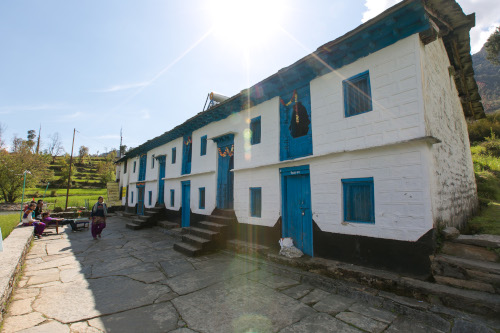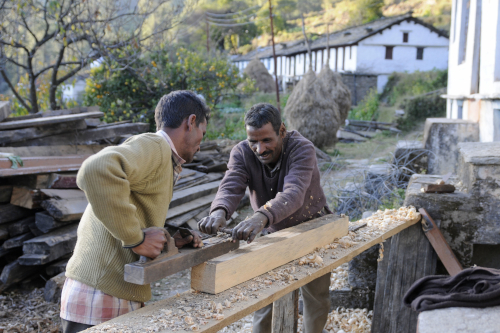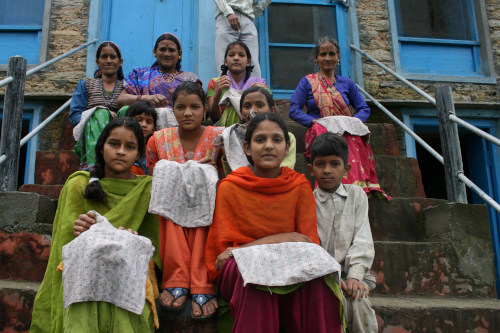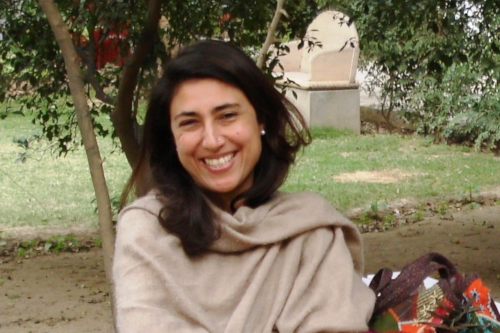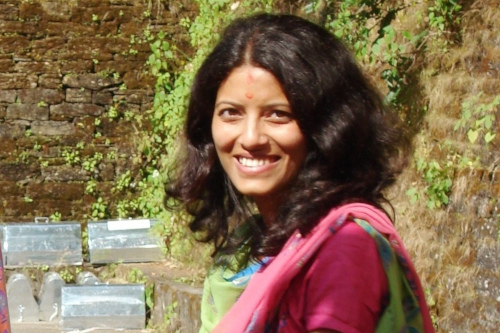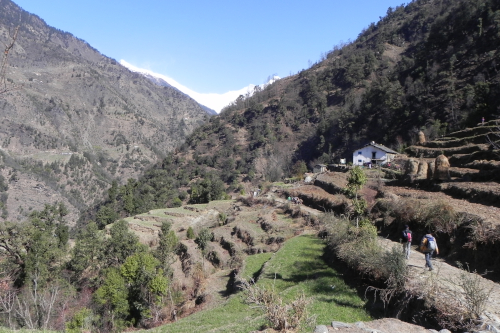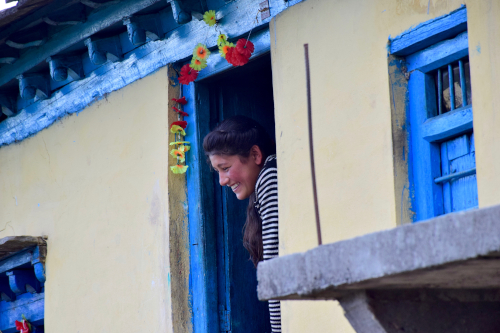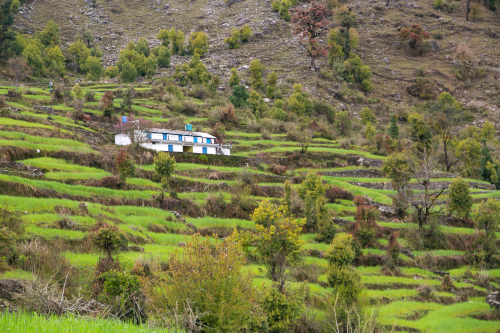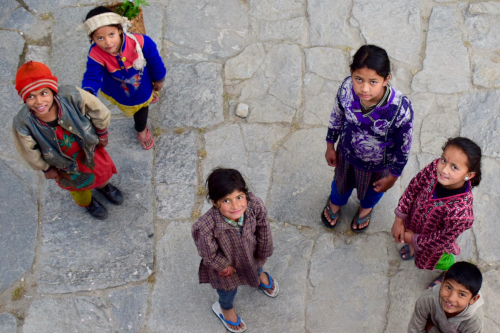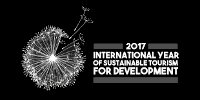The Village Ways Six are Earth Changers.
In 2005 Himanshu Pande was very worried, “I live in a beautiful part of the Indian Himalayan foothills, a wildlife sanctuary, where traditional village life has been sustained for centuries. But today out-migration threatens the very existence of these beautiful stone-built villages… I wondered whether there was any way tourism could help”. This concern led to the establishment of Village Ways.
Places
The Pande family had owned and run Khali Estate Mountain Hotel for many years. This is no ordinary hotel! Built during the British Raj for the district administrator, Khali had shadowed twentieth century Indian history. Following its role during the Raj, it became successively an ashram for Mahatma Gandhi, a retreat for Nehru and visited by Mrs Gandhi’s family.
Khali overlooks the hills and valleys of the Binsar Wildlife Sanctuary with a backdrop of the high peaks of the Indian Himalayas.
“I wondered whether there was any way tourism could help sustain the villages of the Binsar Sanctuary. It was a long shot, tourism was unknown by these remote agricultural village communities. I was lucky enough to know Keith Virgo (an international rural development consultant with over 20 years’ experience in the Himalayan regions of India and Nepal, specialising in community-based participatory development and environment) and Graham Edgeley (an agricultural economy and rural community-based tourism expert), regular visitors to Binsar. Both offered huge experience in the problems of rural development and Graham skills in small tour operator management.
Together with my wife, Manisha, the four of us discussed ideas and we asked regional authorities whether there were any funds to help these villages. We drew an initial blank but we had a strong sense that something could be done so long as we could involve a large proportion of each village community.”
The tentacles of friendship spread a little further with Keith calling on Ratnamala Kapur a dynamic business woman from Delhi with a passion for rural traditions and crafts. Graham turned to Richard Hearn for his experience in rural tourism and a fellow traveller in responsible tourism: Richard was the founder of UK tour operator Inntravel, Chairman of the Association of Independent Tour Operators (AITO) 2005-6 and founded the Association's Responsible Tourism Committee in 2001.
Purpose
“It was an exciting time when the six of us first got together in Binsar. I remember a day when we all went along to a village furniture maker for ideas of how to furnish a possible guest-house and spent a large part of the afternoon bouncing up and down on mattresses to test them for the sensitive behinds of European guests!
We worked on ideas, the values we wished to work to, concepts for village accommodation, concepts for creating market driven product. Most importantly we set three principles for working with each village community:
the village must wish to host guests,
the village must have a need for an additional income stream to be shared as widely as possible through the village,
and we, the founders, must be convinced of the marketability of each place.
At the core of the idea was the creation of a village owned guest-house in each village.
We could not find any funding assistance, so if we were to proceed the funding had to come from us, so I guess we all put our hands in our pockets and got going. We developed a grant and loan model. Four and then five villages joined in. We set up village tourism committees, initiated training and helped design and convert or build the guest house from local resources”.
It was a lucky encounter, but each of the group assumed they were setting up a micro business purely to sustain the villages of the Binsar Sanctuary. They all had other busy lives.
Luck in any start up needs to be seized. And so it was with this venture. The first offering was a success, written about in glowing terms in the international press and loved by the good number of guests attracted in the first 18 months. Attitudes changed and regional agencies came forward to offer help with funding should the group consider expanding activities to other regions of Uttarakhand State. So the decision was taken, Village Ways was born and tasks were allocated.
People
Manisha Pande: “If we were going to grow it was important to spread our human resources wisely. I could see we were a group of people with wide and deep experience. In fact I was probably the least experienced. Himanshu and his family had hands on experience of hospitality and deep knowledge of the local rural communities. Keith and Graham have years of experience in agricultural and rural development, Ratnamala has strong connections amongst the Delhi business fraternity and long association with the foothills of the Himalayas. Richard and Graham brought long experience of international tourism marketing, business structure and a belief in the international responsible tourism movement. So much of this experience and long hours of work was given freely by our group. We knew that ultimately the business had to be profitable to have a long-term future, but we had to get there slowly. So we developed the philosophy of “profitability from the bottom up”.
Most important were the village communities, the real heroes of this story. It was important their efforts in hospitality were rewarded with a steady secondary income stream. I won’t pretend it was easy, keeping up standards and explaining the vagaries of consumer demand.
Himanshu and Keith, with other local help, focused on the village communities – the structure and development of the tourism committees, training needs, local supply chains and much, much more. Today their work is a continuum of meetings, encouraging, advising and generally growing these marvellous Village Tourism Enterprises (VTE). Himanshu commands huge respect with the village communities.
Ratnamala took on the enormous task of establishing a charitable foundation to run alongside the business. The aim of this trust was to help develop skills and to favour outlying villages not directly impacted by the tourism ventures, capacity building and in communities’ enterprises to encourage income generation. Today this has established a highly regarded women’s centre in the Saryu Valley and has assisted many ladies with new skills.
Graham and Richard set about designing and developing product created out of a growing network of VTEs and finding a sustainable route to market. With outlets in the UK and France as well as our direct sales from India they have built a solid foundation for sustained growth.
That left me to run the administration. New to this work I was not entirely sure of myself.”
Richard: We could all see in Manisha that rare gift, so necessary in an entrepreneur, of being able to worry and fret over detail whilst keeping a steady eye on the main picture and larger goals. Manisha has this skill by the bucket load. She has led from the front and leads a first-class sales, marketing and administration team. This work requires sensitivities in three directions: to our guests to the village communities or our ‘hosts’; and to the staff both directly and indirectly employed, the ‘team’.
It is a huge work-load and I can’t think of anyone more capable to manage this complexity. I am sure under Manisha’s continuing tutelage it will keep moving forward.”
Manisha: That’s all very nice, but I recognise I still have much to learn. That is the great thing, we are all learning from one another all the time, from our mistakes, setbacks and from our success. We have made many mistakes, trying to expand too fast with grandiose plans, trying to grow out of our region of core competence (India and adjacent countries). We have had setbacks, international adverse publicity about India sending visitor numbers crashing down, the dreadful earthquake in Nepal affecting tourism not just in Nepal but across the Himalayas for a couple years.
But the momentum is with ‘steady as you go’ success. Not dramatic, but solid appreciation from guests, growing skills and capacity from the VTEs and a business becoming more sure-footed as each year progresses. We have created over twenty separate VTEs, each a little business in its own right.
These communities remain agricultural, their main source of income, but tourism has become for them a low impact valuable secondary source of income. We attach great importance to maintaining this balance.
On the international front new skills have been brought in to build on our financial and marketing abilities, pushing forward the commercial necessity of the enterprise.
We recognised that as this main thrust has to be commercial, but we style ourselves a social enterprise, so we must protect our original founding principles.
To help with this we set up an ‘Advisory Council’ of the original founders kindly chaired by Professor Harold Goodwin. This council meets annually to look at the balance between ‘social’ and ‘enterprise’. Are we having an impact on out-migration? Are we providing a much-needed secondary income? How widely is this being distributed amongst the community? To aid this work we are running and publishing monitoring exercises to trace the social and financial impact of tourism. This work was rewarded by the World Travel Market 2017 award for work ‘in reduction of poverty’.
I suppose the source of my greatest pride is guest reaction and appreciation. It seems we have found the source of very rewarding holidays. Our guests return entranced by their experience of a great holiday coupled with unique cultural exchange. The most common word of appreciation? ‘Privilege’.
My work now takes me to levels I had never expected. I have delivered speeches and attended seminars in London, Delhi and Cape Town. With others I have instigated training work in rural tourism for the State of Uttarakhand, a project that is likely to grow in the future. Looking outwards we have started an association, a network if you like, of like-minded tourism businesses. Called Grass Routes we are starting to bring together local and regional operators whose purpose is to foster village life. Initially it is an idea of mutual promotion, but who knows where the future will take us”.
All six founders remain involved, dividing their expertise and focus between development work in India and other countries, Village Ways Charitable Trust, Village Ways Advisory Council and developing the Grass Routes concept.
How you can be an Earth Changer:
Visit India’s real village life across the Himalayas
Walk from village to village in the foothill of the Himalayas discovering an extraordinary experience of India’s rural life whilst providing important supportive income to help sustain remote communities.


